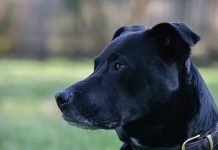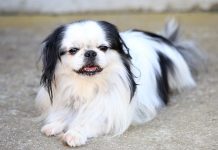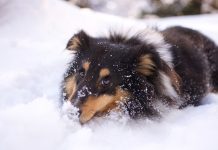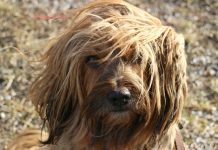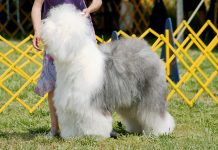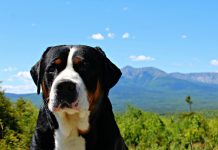History and Origins of the Cocker Spaniel Breed:

The Cocker Spaniel is a beloved breed with a rich history that traces back to 14th century Spain. Originally bred as hunting dogs, Cocker Spaniels were specifically developed to hunt woodcock—a bird known for hiding in dense cover. Their name “Cocker” is derived from their adeptness at hunting woodcock.
The breed’s development continued in England, where it gained popularity as a skilled bird hunter, particularly for woodcock and other game birds. Over time, distinct varieties of Spaniels emerged based on size and function, including the larger “Field Spaniels” and the smaller “Cocker Spaniels.”
In 1892, the American Kennel Club (AKC) officially recognized Cocker Spaniels as a breed. Today, the Cocker Spaniel is cherished worldwide as a versatile and loving companion, excelling not only in hunting but also as a cherished family pet.
Physical Characteristics and Appearance of Cocker Spaniels:
Cocker Spaniels are medium-sized dogs with a distinctive appearance and elegant carriage. Here are key physical characteristics of the breed:
- Size: Cocker Spaniels are typically around 13.5 to 15.5 inches (34 to 39 cm) in height at the shoulder, with males slightly larger than females. They usually weigh between 24 to 30 pounds (11 to 14 kg).
- Body: The body is well-balanced and compact, with a sturdy build suitable for both work and companionship.
- Head: Cocker Spaniels have a refined head with a broad skull and well-defined stop. The muzzle is square and balanced, with a strong jaw.
- Eyes: One of the most striking features of Cocker Spaniels is their large, expressive eyes. They are dark and round, conveying a gentle and intelligent expression.
- Ears: Cocker Spaniels have long, pendulous ears that are well-feathered. The ears frame the face beautifully and contribute to their classic Spaniel look.
- Coat: The breed’s coat is one of its most distinctive features. Cocker Spaniels have a dense, silky coat that can be flat or slightly wavy. They come in a variety of colors, including solid black, liver, red, or parti-color combinations like black and white or liver and white.
- Tail: The tail is typically docked to a medium length, although docking practices have become less common in some countries.
Overall, Cocker Spaniels are known for their happy disposition, elegant appearance, and beautiful flowing coat. They are a versatile breed, excelling in various canine activities including hunting, obedience, agility, and most importantly, as cherished companions in loving homes.
Cocker Spaniel Temperament and Personality Traits:
Cocker Spaniels are known for their affectionate and friendly nature, making them wonderful family companions. Here are some key temperament and personality traits of Cocker Spaniels:
- Friendly: Cocker Spaniels are typically very sociable and enjoy being around people. They are known for their gentle and affectionate demeanor, making them excellent family pets.
- Playful: Cocker Spaniels have a playful and lively personality. They enjoy interactive play and thrive on attention from their families.
- Intelligent: This breed is highly intelligent and eager to please, which makes training relatively easy. They respond well to positive reinforcement techniques.
- Loyal: Cocker Spaniels are loyal and devoted to their families. They form strong bonds with their owners and are often protective of them.
- Alert: As hunting dogs by nature, Cocker Spaniels are alert and make excellent watchdogs. They will alert their owners to any perceived threats or unusual activities.
- Adaptable: Cocker Spaniels are adaptable dogs that can thrive in various living situations, including apartments or larger homes, as long as they receive adequate exercise and attention.
- Affectionate: One of the standout traits of Cocker Spaniels is their affectionate nature. They love cuddling with their owners and thrive on physical affection.
- Eager to Please: Cocker Spaniels have a strong desire to please their owners, which makes them responsive to training and eager to learn new commands.
- Good with Children: Cocker Spaniels are generally good with children, although early socialization and supervision are important to ensure positive interactions.
Overall, Cocker Spaniels are known for their sweet and loving temperament. They enjoy being part of the family and thrive on companionship and interaction with their human companions.
Training and Socialization Needs for Cocker Spaniels:
Training and socialization are important aspects of raising a well-behaved and well-adjusted Cocker Spaniel. Here are some key considerations:
- Early Socialization: Start socializing your Cocker Spaniel puppy early to expose them to various people, places, and experiences. This helps them develop into confident and well-mannered adults.
- Basic Obedience Training: Cocker Spaniels are intelligent and eager to please, making them responsive to training. Use positive reinforcement techniques such as treats, praise, and rewards to teach them basic commands like sit, stay, and come.
- Consistent Training: Be patient and consistent with training sessions. Keep training sessions short and enjoyable to maintain your Cocker Spaniel’s interest and motivation.
- Exercise Needs: Cocker Spaniels are active dogs that require regular exercise to stay healthy and happy. Daily walks, playtime, and interactive games are essential to meet their exercise needs.
- Grooming Routine: Cocker Spaniels have a dense coat that requires regular grooming to prevent matting and tangles. Establish a grooming routine early on to keep their coat in good condition.
- Positive Reinforcement: Use positive reinforcement methods such as treats, praise, and toys to reward good behavior and encourage desired responses during training.
- Social Interaction: Expose your Cocker Spaniel to other dogs, animals, and people in a controlled environment to promote positive socialization and prevent fear or aggression.
By providing consistent training, socialization, and love, you can help your Cocker Spaniel develop into a well-rounded and well-behaved companion. Their intelligence, eagerness to please, and friendly nature make them a joy to train and interact with.
Health Considerations and Common Issues in Cocker Spaniels:
Cocker Spaniels are generally healthy dogs, but like all breeds, they are prone to certain health conditions. It’s important for Cocker Spaniel owners to be aware of these potential issues and take proactive measures to maintain their dog’s health. Common health considerations in Cocker Spaniels include:
- Ear Infections: Cocker Spaniels are known for their long, floppy ears, which can trap moisture and debris, leading to ear infections. Regular ear cleaning and inspection are essential to prevent infections.
- Eye Problems: Cocker Spaniels are susceptible to eye conditions such as cataracts, glaucoma, and progressive retinal atrophy (PRA). Regular veterinary check-ups can help detect and address eye issues early.
- Skin Allergies: Some Cocker Spaniels may develop skin allergies, resulting in itching, redness, or hot spots. Proper grooming, a balanced diet, and allergy testing can help manage skin issues.
- Hip Dysplasia: This genetic condition occurs when the hip joint doesn’t develop properly, leading to pain and mobility issues. Regular exercise and maintaining a healthy weight can help reduce the risk of hip dysplasia.
- Luxating Patella: Cocker Spaniels may experience patellar luxation, where the kneecap dislocates from its normal position. This condition can cause limping or lameness and may require surgical correction.
- Heart Conditions: Some Cocker Spaniels are prone to heart diseases such as mitral valve disease. Regular veterinary exams and monitoring can help manage heart conditions effectively.
- Obesity: Cocker Spaniels love food and treats, making them prone to obesity if their diet is not properly regulated. Maintaining a healthy diet and providing regular exercise are essential to prevent obesity-related health issues.
- Autoimmune Disorders: Certain autoimmune disorders, such as autoimmune hemolytic anemia (AIHA), may occur in Cocker Spaniels. Early diagnosis and treatment are crucial for managing autoimmune conditions.
Living with a Cocker Spaniel: Suitable Environments and Lifestyle Considerations:

Cocker Spaniels are adaptable dogs that can thrive in various environments, but they require certain considerations to ensure their well-being and happiness:
- Regular Exercise: Cocker Spaniels are active dogs that require daily exercise to stay healthy and prevent boredom. Plan for regular walks, playtime, and mental stimulation to keep your Cocker Spaniel physically and mentally engaged.
- Grooming Routine: Cocker Spaniels have a dense coat that requires regular grooming to prevent mats and tangles. Establish a grooming routine that includes brushing, bathing, and ear cleaning to keep their coat and skin healthy.
- Social Interaction: Cocker Spaniels are social dogs that enjoy companionship. They thrive on human interaction and may experience separation anxiety if left alone for long periods. Ensure your Cocker Spaniel receives plenty of attention and socialization.
- Training and Mental Stimulation: Keep your Cocker Spaniel’s mind engaged with training sessions, puzzle toys, and interactive games. They excel in obedience training and enjoy learning new tricks.
- Veterinary Care: Schedule regular veterinary check-ups and vaccinations to monitor your Cocker Spaniel’s health and address any potential issues early.
- Child and Pet Compatibility: Cocker Spaniels are generally good with children and other pets, but supervision is recommended to ensure positive interactions. Teach children how to interact with dogs safely and respectfully.
- Safe Environment: Create a safe environment for your Cocker Spaniel by puppy-proofing your home, securing fences, and removing potential hazards.
By providing a loving home, regular veterinary care, proper grooming, and plenty of exercise and mental stimulation, you can ensure that your Cocker Spaniel lives a happy, healthy, and fulfilling life as part of your family.
Cocker Spaniel Variations and Breeding Practices
Cocker Spaniels are a popular breed known for their friendly demeanor and beautiful coats. While there are primarily two recognized varieties of Cocker Spaniels—American Cocker Spaniel and English Cocker Spaniel—there can be variations within these categories based on breeding practices and specific traits. Here’s a closer look at Cocker Spaniel variations and common breeding practices:
1. American Cocker Spaniel vs. English Cocker Spaniel:
- American Cocker Spaniel: This variety is slightly smaller and has a more rounded head compared to the English Cocker Spaniel. They are known for their lush, flowing coats and expressive eyes. American Cockers are bred primarily as companion dogs.
- English Cocker Spaniel: English Cockers are larger and have a more elongated head with a defined stop. They are bred as versatile hunting dogs, known for their keen sense of smell and athleticism.
2. Coat Colors and Patterns:
- Cocker Spaniels come in a variety of coat colors and patterns, including solid colors (such as black, liver, or shades of red) and parti-colors (such as black and white, liver and white, or roan patterns).
- Breeding practices may focus on specific coat colors or patterns to achieve desired aesthetics in show dogs or companion animals.
3. Working vs. Show Lines:
- Some breeders specialize in producing Cocker Spaniels for specific purposes, such as show competitions or field trials.
- Working lines may emphasize traits like hunting instinct, endurance, and field performance.
- Show lines may prioritize physical appearance, coat quality, and temperament suitable for conformation shows.
4. Breeding for Health and Temperament:
- Responsible breeders prioritize health and temperament in their breeding programs. They conduct health screenings to minimize the risk of hereditary conditions common in Cocker Spaniels, such as hip dysplasia, eye disorders, and autoimmune diseases.
- Temperament is a crucial consideration, as Cocker Spaniels should be friendly, outgoing, and well-mannered. Breeding for good temperament ensures that puppies grow up to be well-adjusted family pets.
5. Size and Structure:
- Within the American Cocker Spaniel variety, there may be variations in size and structure. Some breeders focus on producing smaller “toy” Cockers or larger “field-bred” Cockers.
- English Cocker Spaniels may also vary slightly in size and build based on breeding objectives.
6. Preservation of Breed Standards:
- Ethical breeders adhere to established breed standards set by kennel clubs like the American Kennel Club (AKC) or the Kennel Club (UK). These standards outline desired characteristics in terms of appearance, temperament, and working ability.
- By following breed standards, breeders contribute to the preservation and improvement of the Cocker Spaniel breed.
7. Companion vs. Working Dogs:
- While many Cocker Spaniels are beloved companion animals, some are bred specifically for hunting and retrieving purposes.
- Working lines of Cocker Spaniels may have different energy levels and instincts compared to those bred solely for companionship.
Overall, Cocker Spaniels exhibit versatility in terms of appearance, temperament, and purpose. Responsible breeding practices aim to produce healthy, well-rounded dogs that excel as loving pets, skilled hunters, or successful show dogs, while preserving the breed’s unique qualities and characteristics.
50 Best Names with Meanings For Cocker Spaniels
Here’s a list of 50 best names with meanings for Cocker Spaniels:
- Charlie – Free man
- Lucy – Light
- Max – Greatest
- Sadie – Princess
- Buddy – Friend
- Luna – Moon
- Bailey – Courtyard within castle walls
- Milo – Soldier or merciful
- Rosie – Rose
- Cooper – Barrel maker
- Lola – Strong woman
- Toby – God is good
- Zoe – Life
- Oscar – God spear
- Daisy – Day’s eye
- Rocky – Stony
- Molly – Bitter or strength
- Baxter – Baker
- Sophie – Wisdom
- Jack – God is gracious
- Coco – Chocolate bean
- Gus – Great
- Ruby – Red gemstone
- Sammy – Sun child
- Scout – To listen or watch
- Minnie – Of the mind
- Winston – Joy stone
- Hazel – Hazelnut tree
- Teddy – Wealthy guardian
- Ginger – Pep or liveliness
- Finn – Fair
- Millie – Gentle strength
- Riley – Courageous
- Maggie – Pearl
- Archie – Genuine or bold
- Penny – Weaver
- Dexter – Right-handed
- Poppy – Flower
- Benji – Son of my right hand
- Maisie – Pearl
- Murphy – Sea warrior
- Willow – Slender and graceful
- Harley – From the hare’s meadow
- Nala – Successful
- Zeus – King of the gods
- Lexi – Defender of mankind
- Rusty – Red-haired
- Lily – Pure and innocent
- Rocco – Rest
- Annie – Grace
Feel free to choose any of these names for your Cocker Spaniel based on their meanings and your personal preferences. Each name carries its own significance and can perfectly suit your beloved furry friend!

In conclusion, this complete guide to Cocker Spaniel dogs has provided a comprehensive overview of this beloved and versatile breed. Throughout our exploration, we’ve delved into the history, distinctive characteristics, and essential care considerations that define Cocker Spaniels. Known for their friendly demeanor, intelligence, and beautiful coat, Cocker Spaniels make wonderful companions for families and individuals seeking an affectionate and active dog. They excel in various roles, including hunting, obedience, and therapy work, showcasing their adaptability and willingness to please. As you embark on your journey with a Cocker Spaniel, may you appreciate their unique qualities and form a strong bond with this delightful breed, creating lasting joy and companionship together.







